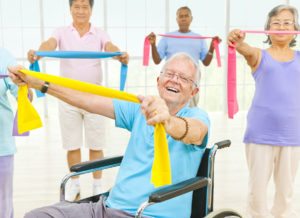Keeping Your Brain Sharp
Senior Care in Chester PA

For many elder care patients, it’s the latter. In fact, consider these national statistics from the Alzheimer’s Association (www.alz.org):
- Over 5.3 million older adults in the United States suffer from Alzheimer’s and every 67 seconds, another person in the U.S. develops it.
- Alzheimer’s disease is the 6th leading cause of death in the United States;.
- One in three seniors dies of Alzheimer’s or another dementia and nearly two-thirds of Americans with Alzheimer’s are women
Despite these alarming statistics, there are things that can be done to help. Research has revealed that older adults CAN grow new neurons; they CAN make new connections and rewire their brains. Brain (Cognitive) exercise is the key, while brain health can be multi-faceted, but if tackled correctly, can be highly successful.
Physical exercise and maintaining a good weight are at the top of the list for importance in maintaining brain health. They help the aging brain create new connections, new neurons, and improve one’s memory. And there are different things people can do to exercise different parts of the brain. Social engagement, for example, is essential for brain health.
People at senior centers or who live in assisted living facilities often go to an exercise class or participate in card games, crafts, etc., because a friend or neighbor is going. But when people have conversations with each other while exercising or doing some other activity, it is a huge brain stimulator, it’s all part of cognitive stimulation, whereas isolation and loneliness can be direct causes of depression, which can lead to dementias.
When seniors maintain or improve their cognition, they will not have as many falls, they will be able to be independent longer, they will be able to engage better, and if someone has mild to mid-dementia things can improve somewhat, giving them back some of what they have lost or are in the process of losing.
The Alzheimer’s Research and Prevention Foundation says that regular physical exercise is key – reducing one’s risk of Alzheimer’s or some other dementia by 50 percent. In folks who have already suffered a cognitive slip, it can at least cause the deterioration to slow down somewhat. But exercising, especially if you’re not used to it, can seem like drudgery. So pick an exercise you enjoy and try to do it with a friend. If doing it alone, try to combine it with listening to music, watching TV or reading a book.
Finally, the Foundation says that “a combination of both aerobic and strength training exercise is better than either one done alone.”
If you or an aging loved one are considering in-home Senior Care in Chester, PA, please contact the caring staff at True Direct Home Health Care today.
- How Home Health Providers Offer Education Amidst Physical Health Changes - March 5, 2024
- Spring Activities for Seniors - February 21, 2024
- How to Help an Older Loved One with Cataracts? - February 6, 2024
